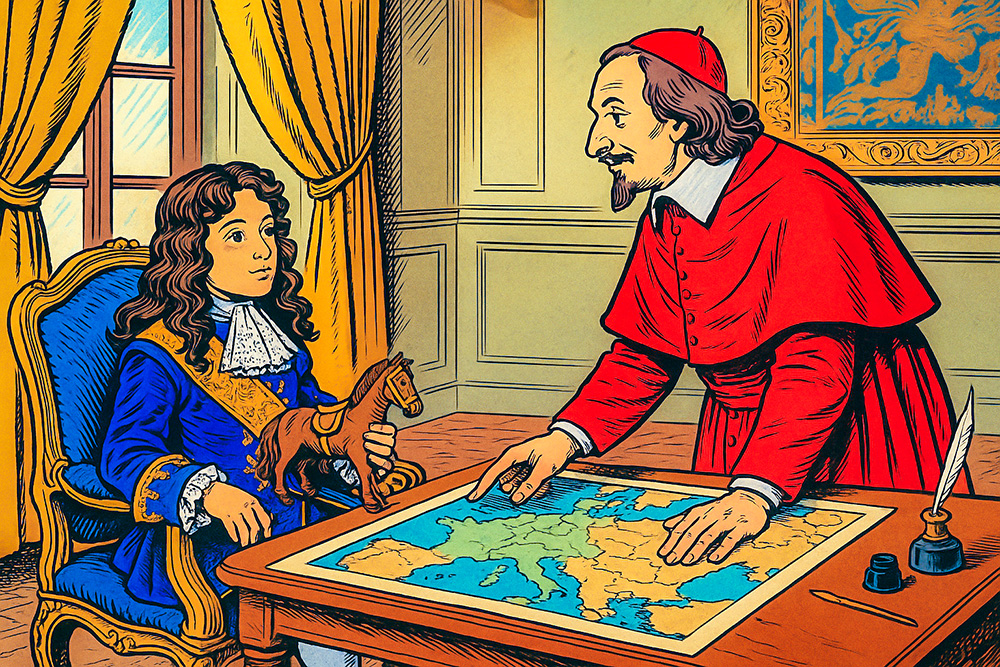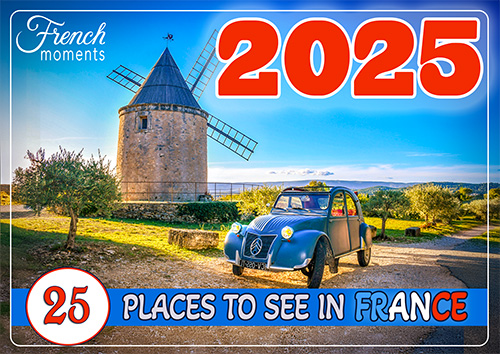Let's imagine Louis XIV and Mazarin meeting in October 1648, when Europe awoke from a thirty-year nightmare.
In Münster and Osnabrück, pens finally replaced cannons: the Peace of Westphalia was born.
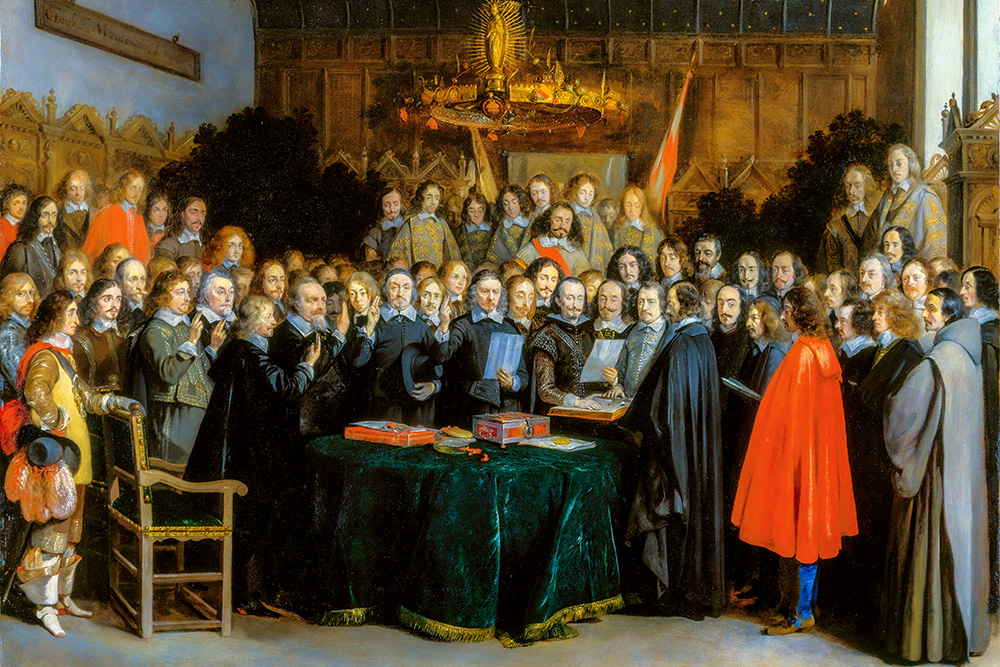
Signature of the Peace of Westphalia - Münster, 24 October 1648
While the diplomats wiped the sweat from their brows, in Paris, a ten-year-old boy listened with bright curiosity.
His name was Louis XIV.
Before him stood a cardinal in deep red robes, eyes sharp, smile cautious — Mazarin.
The cardinal had just secured for France a curious treasure: a province of blurred frontiers, woven from a thousand lordships and mingled tongues — Alsace.
What follows is an imagined conversation between Louis XIV and Mazarin, freely inspired by the political and diplomatic realities of 1648.
Nothing is invented in substance — only seen through the eyes of those who lived it.
The young king is learning the world; Mazarin, ever the mentor, is teaching him how to rule.
A quiet cabinet scene, light in tone yet precise in detail, where the future of a region — and the idea of a patient, diplomatic, and already European France — begins to take shape.
I hope you find the reading as pleasant as it is enlightening.
Louis XIV and Mazarin: Scene Opening
Palais-Royal, an October morning, 1648.
Autumn light filters through the tall windows.
A large map of the Holy Roman Empire lies spread across a table, its surface bristling with pins.
A golden compass gleams beside an inkwell.
From the corridor beyond come the faint clatter of spurs and the murmur of restrained voices.
The young king, LOUIS XIV, ten years old, sits in a chair far too large for him, holding a small wooden horse.
MAZARIN, forty-six, enters — dark cloak, travel-stained boots — and bows with a measured smile.
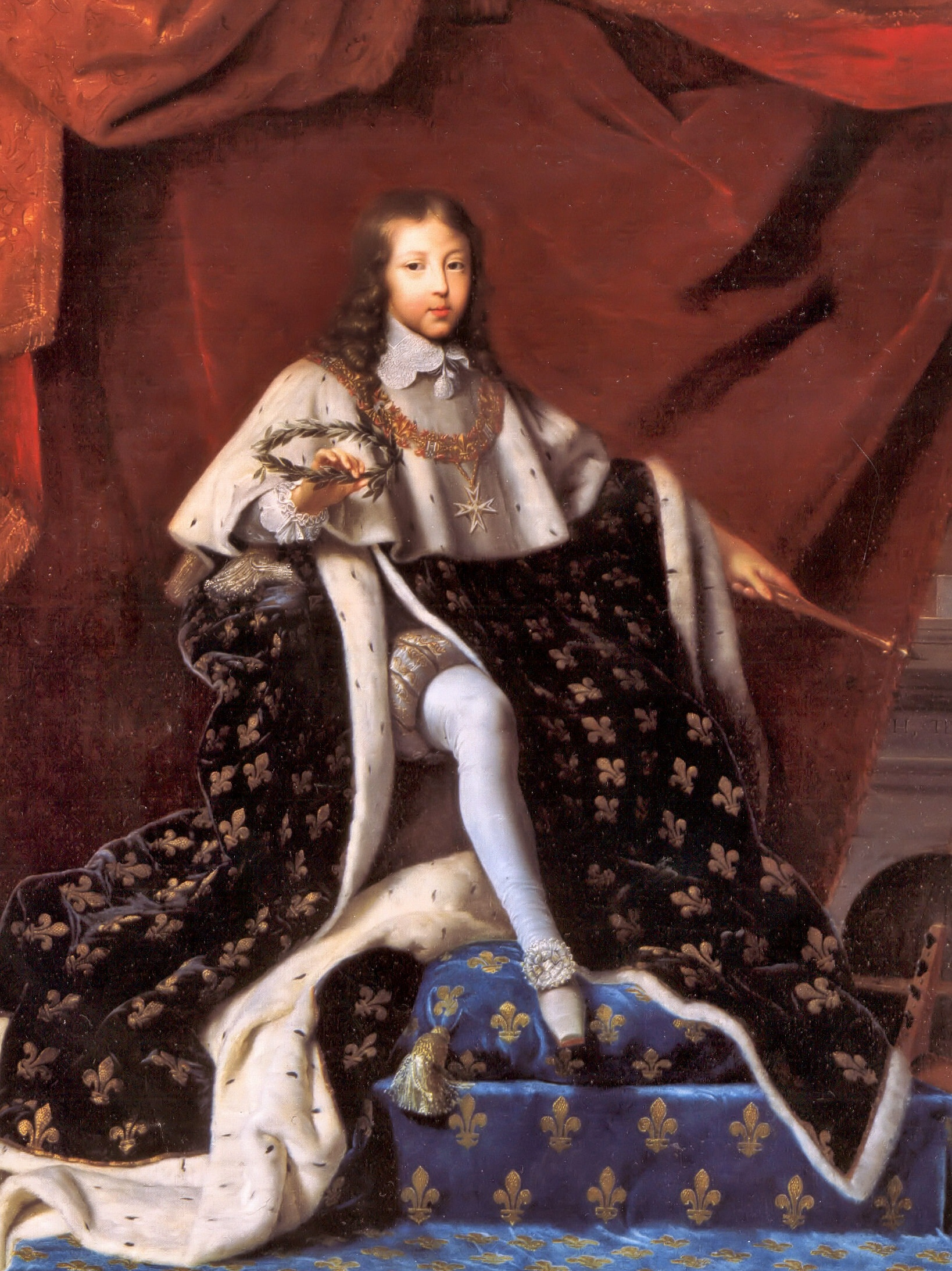
Louis XIV in 1648 age 10 by Henri Testelin
LOUIS XIV — You arrive at last, Cardinal! They tell me Europe has made peace again… or almost. So then? Have we won a war I did not fight?
MAZARIN (bowing) — Sire, we have won better than a battle: peace itself. Pace, Maestà. And a treaty so finely stitched, I trust it shall last longer than a Swedish trooper’s boots.
LOUIS XIV — They say you negotiated in two cities at once. Is that even possible?
MAZARIN — Indeed, Sire. Münster for the Catholics, Osnabrück for the Protestants. Two towns, thirty miles of mud between them, messengers losing their hats, and secretaries quarrelling over who gets the chair nearest the fire. Diplomacy, Sire, is often a matter of choosing the right chair.
LOUIS XIV (laughing) — And who took the best one?
MAZARIN — He who did not sweat to get it. Una regola d’oro. But let us come to the heart of it, Sire. Three texts make up what men already call the Peace of Westphalia:
— One settles our affairs with the Empire;
— Another, with Sweden;
— And a third ends that weary quarrel of eighty years between Spain and the United Provinces, now independent — without asking our leave, but we shall allow it.
LOUIS XIV — So everyone gained a little. And we — what have we taken without lifting the sword? (He leans over the map.) Tell me truly: what becomes of Alsace?
MAZARIN (placing a careful hand upon the map) — Ah, Alsace… a millefeuille of lordships, free cities, abbeys, and feudal rights plaited together like those Alsatian braids of which I have heard so much. The Empire scattered the keys; we have found the lock.
LOUIS XIV — Is that a lawyer’s jest?
MAZARIN — It is the art of writing a phrase that opens doors. Listen: in the Treaty of Münster, Article LXXV, the Emperor cedes to us — I quote in substance — “the Landgraviate of Upper and Lower Alsace, the Sundgau, and the Provincial Prefecture over the ten towns.” It is not a pretty ribbon upon a parcel; it is the key to all its drawers.
LOUIS XIV (frowning) — I hear you, but I do not yet see the horse.
MAZARIN (smiling, patient) — We did not ask for borders drawn by the compass, Sire. We asked for rights — those held by the Habsburgs in Upper Alsace, and the Landvogtei, the imperial prefecture overseeing ten towns: Haguenau, Colmar, Sélestat, Obernai, Kaysersberg, Turckheim, Rosheim, Wissembourg, Munster, and Landau.
By receiving those rights, we take the place of the Habsburgs — and above them, we become the protector of these towns. That is not the same as annexing with fanfare. It is subtler. Più fine, Sire.
LOUIS XIV — So, if I understand correctly: we have the Sundgau outright… but the ten towns keep their old habits?
MAZARIN — Precisely. The Sundgau — with Belfort and Ferrette — falls into our lap without dispute. There we shall post garrisons and appoint intendants, so that your commands may meet few obstacles. But the towns of the Decapolis, that is another matter. They retain their privileges, their councils in German, their justice according to the usages of the Empire. We are their protector rather than their master. It is a cloak laid upon shoulders that are not yet ours.
LOUIS XIV (mischievous) — A cloak we might… tighten later?
MAZARIN (with a discreet wink) — If the cold comes, Sire, we tighten. Piano, piano. We have gained the essential thing — the right to be present. The rest is a matter of patience, elegant letters, and carefully chosen magistrates.
LOUIS XIV — And Strasbourg? They say it is the finest key to the Rhine. Do we have it in our pocket?
MAZARIN (after a pause) — Strasbourg… is outside the text, Sire. A Free Imperial City these many years — proud of its liberties, industrious, learned, very Protestant… It has not been ceded. It remains independent within the Empire. We left it outside the platter — for now.
LOUIS XIV (tapping the compass on the table) — And you call that a complete peace?
MAZARIN — A possible peace, Sire. Had we demanded Strasbourg, the Empire would have offered us another war. And Your Majesty is ten years old — admirable for ruling a ball, but somewhat tender for ruling a campaign. We secure first the Sundgau and the crossings of the Rhine we could reach; the rest, we watch. Saper vedere, Maestà.
LOUIS XIV — You mentioned ten towns. Then they belong to us?
MAZARIN — They look to us — which is already much. Our title of prefecture, the Landvogtei, gives us voice, eye, and hand in their affairs without abolishing their liberties. They will still strike coin, judge by their customs; but when in time they seek an arbiter or a protector, they will come to us — not to Vienna.
LOUIS XIV — So they will speak German to a king of France?
MAZARIN (smiling) — The language in which one counts is not always the one in which one rules. We shall answer them in French, politely — and sometimes in Latin, if that soothes them. What matters is obedience. L’obbedienza, Sire, is a melody one learns quickly when it pays the wages.
LOUIS XIV — And Mulhouse? I have heard that name whispered like a pebble in one’s shoe.
MAZARIN — Mulhouse is not in our basket. A republic allied to Switzerland, it left the Decapolis long ago. The treaties, most wisely, say nothing of it: it remains independent under the guard of its Helvetic friends. No need to jostle a small town that knows how to count — and to weave. We shall let it breathe. One breathes better when facing the right side of the Rhine.
LOUIS XIV — So then, we hold the south — Sundgau, Belfort — we cast our shadow over the ten towns, we leave Mulhouse at peace, and Strasbourg escapes us. I see a painting with missing strokes.
MAZARIN — È un lavoro di pazienza. What is missing today will become your glory tomorrow. Through the rights we have just acquired, we may demand that they answer us, show us their titles and charters, acknowledge your suzerainty where the Habsburgs once claimed it. With enough light, the shadows retreat.
LOUIS XIV — You speak as if parchment could conquer cities.
MAZARIN — It does, Sire. A city taken by arms will rebel; a city convinced by law will reorganise. We shall apply, to the letter, what we have obtained: the Landgraviate of Alsace, the Sundgau, and the right of prefecture over the Decapolis. Diritto sopra il territorio, yes — but with tact. No harshness: protection first, administration after.
LOUIS XIV (leaning over the map) — Show me the Sundgau. Where shall we place soldiers?
MAZARIN (unfolding a second sheet, pointing) — Here, Belfort — the key of passage — which we shall fortify. There, Ferrette. That will be your first foundation. From there, we shall watch Colmar, Sélestat, Haguenau — not to smother them, but to be present when they need an arbiter stronger than their quarrels. The Empire gave them much liberty, Sire, but little help. We shall offer both.
LOUIS XIV — And religion? They say men fight for God as well as for Caesar. Must I convert these towns and their fields?
MAZARIN (gently, with gravity) — We have ended, Sire, a war born of faith and fattened by ambition. The treaties guarantee the coexistence of Catholics, Lutherans, and Calvinists within the Empire. In Alsace, no needless zeal — pragmatism instead. Where the majority prays in one manner, we shall respect it; where an altar may be shared at different hours, it shall be shared. Better two sermons in peace than a riot after vespers. Meglio la pace, Sire.
LOUIS XIV — Two sermons in the same nave? That must make the angels snicker.
MAZARIN — Angels, Sire, love music — so long as it is gentle. And gentleness will serve us well in another matter: the law. We shall not change in one day the procedures of a land so attached to its customs. We will render justice in your name, but often according to local rules. The magistrates will keep their terms and their scripts — per ora — so that obedience may enter without pride taking flight.
LOUIS XIV — You speak of a thread being drawn. Where do we hold nothing at all?
MAZARIN — We hold nothing — for now — in Strasbourg. Little in Mulhouse. Something in the ten towns. Much in the Sundgau. But, Sire, something well used is worth more than a whole poorly held. È aritmetica del potere.
LOUIS XIV — And the Habsburgs? Did they yield with a smile?
MAZARIN (shrugging lightly) — They yielded because they were weary. Thirty years of war have worn the Empire thin. Sweden takes Western Pomerania, Bremen, Verden; the United Provinces win their independence; Spain begins her descent. As for us, we emerge stronger — without bleeding more than prudence allows. Una buona partita, Sire.
LOUIS XIV — I do not want titles only, Cardinal. I want to see what I govern.
MAZARIN — You shall, Sire. We will place loyal men in Ensisheim and Belfort; we shall write to the towns, hear their petitions, even lend money to mend a bridge or raise a market hall. And when your engineers — for you shall have excellent ones — survey the line of the Rhine, they will think of new fortresses, or of strengthening the old. Nothing in haste; all in order.
LOUIS XIV — You speak of fortifications as if they were a tailor’s coat.
MAZARIN — The frontier is a garment, Sire; it must fit you. Today it hangs loose; tomorrow it shall fit perfectly. We have taken the first measurements.
LOUIS XIV (settling into his chair, then straightening proudly) — I am king, you say — yet I am only ten. What can I do?
MAZARIN — Three things, Sire: learn, sign, and wait. Learn, so that you may understand what you sign; sign, so that you may bind what you understand; wait, so that you may receive what you have bound. Alsace is a promise; you shall see its full fruit when your hand is heavier and your years higher.
LOUIS XIV — And if Strasbourg laughs at our patience?
MAZARIN — Let them laugh. The Rhine often laughs at the rash. We already keep watch opposite, at Kehl and at Breisach; we hold the left bank where it matters. Strasbourg shall not sail alone for long. There is no lonelier city, Sire, than one set in the midst of a kingdom to which it does not belong.
LOUIS XIV — You love your metaphors, Monsieur. I prefer numbers. Give me one.
MAZARIN — Ten, for the Decapolis; one, for the well-kept Sundgau; zero battles today for solid gain tomorrow. And if Your Majesty wishes a finer number: LXXV — the article that gives us our lever.
LOUIS XIV (repeating solemnly) — LXXV. Very well. I shall write it upon my heart — until I have my cannons.
MAZARIN (laughing softly) — Keep your cannons for the parades, Sire. For now, the pen will do. We shall write to the towns that the king protects them; we shall assure them their liberties will be respected — so long as their loyalty is clear. We shall see that sermons do not light the powder, and we shall let the notaries keep their Germanisms — so long as they spell them properly. Ordine e pace.
LOUIS XIV — A scruple, Monsieur: they say you slipped ambiguity into the phrasing. Is that fitting for a Christian king?
MAZARIN — Sire, ambiguity is not falsehood; it is a door that opens both ways. We left the Emperor a reading that saves his dignity, and kept for ourselves a reading that secures your authority. God loves peace; and to make it, He permits that one spare a neighbour’s pride. Carità politica, as I would call it.
LOUIS XIV — And if the jurists of the Empire take offence?
MAZARIN — Jurists, Sire, are like cats: they always land on their feet. Ours will land upon the titles we hold; theirs upon those they think they still possess.
MAZARIN (taking a slow breath, amused) — In truth, Sire, this war ended not with the victory of an army, but with the exhaustion of all. And what we have gathered is the one tree still standing when the rest had fallen.
LOUIS XIV (dreamily) — Thirty years of war… I could have been born, grown up, and been bored a thousand times over.
MAZARIN — Europe is rarely bored, Sire. But someone had to close the window on all that noise. We have done so. And because of it, France now looks upon the Rhine without fear.
LOUIS XIV — The Rhine… (He rises and walks toward the map.) So this is that great blue line?
MAZARIN (joining him, finger tracing the river) — The very one. A “natural frontier,” say the poets; a field of ambushes, say the soldiers. It is your future mirror, Sire — every king of France, one day, looks upon himself in the Rhine.
LOUIS XIV (smiling) — And what reflection does it give me today?
MAZARIN — The image of a realm safer than yesterday, but not yet complete. You now possess the left bank — or nearly so. It remains for you to fortify it. Vauban is not yet born for you, but the thought of his bastions is already wandering through men’s minds.
LOUIS XIV (mischievous) — And you, Monsieur — what would you make of this river, if you were king?
MAZARIN (laughing) — I? I would build bridges, tollhouses, fortresses — and a few legends. But I am only a servant. You, Sire, will build France upon it.
(The young king studies the map for a moment, then returns to his chair, gazing at his small wooden horse.)
LOUIS XIV — Tell me, Cardinal, what shall we do with these Alsatians? You call them Germans, Catholics or Protestants by the day, merchants at their leisure, and stubborn always.
MAZARIN (softly) — We shall govern them as they live: in balance. They will keep their laws, their tongues, their shared bell towers. We have promised tolerance, and I advise you, Sire, to keep that word. Loyalty often springs from gentleness.
LOUIS XIV — Then you fear they will resist?
MAZARIN — No, I fear they will remember too well. Alsace has changed masters so often it no longer believes in promises. It is for us to teach her faith in stability.
LOUIS XIV (hesitant) — And if I make them love me — will they be French?
MAZARIN — They will become so without saying it. And that, Sire, is a king’s finest victory — the one that needs no proclamation.
(A silence. The young king toys with the golden compass, then sets it down upon the map of the Sundgau.)
LOUIS XIV — Here, you say, is Belfort. And there, Ferrette. I should like to see these places one day.
MAZARIN — You shall, Sire. You will also see Colmar — its slate roofs and wine markets — Haguenau and its forests, Sélestat and its library. Alsace is France speaking another tongue, yet France all the same.
LOUIS XIV — And Mulhouse, the obstinate one?
MAZARIN — Ah, Mulhouse! A small weaving republic in love with Switzerland. She thinks herself safe behind her bales of cloth. Leave her be. One day she will come of her own accord, when she sees her future leaning our way. Patience, Sire, is sometimes the strongest fortress.
LOUIS XIV (looking up at him) — You speak to me often of patience, Monsieur. Is that your only art?
MAZARIN (smiling) — It is the one that lasts, Maestà. War exhausts; patience governs.
LOUIS XIV — Then you are the king of the patient ones?
MAZARIN (lightly) — Let us say I am their minister.
(They both laugh. Mazarin walks to the window and gazes at the grey October sky.)
MAZARIN — Look, Sire, at that pale light — it is the light of a Europe at rest. Thirty years of carnage have emptied the granaries and filled the graveyards. We have signed a peace that gives the continent breath again — and, by happy chance, gives France a broader future.
LOUIS XIV — You speak like a priest.
MAZARIN — Like a priest of politics, Sire. That calling too requires confessions.
LOUIS XIV — Then confess this to me: have we won by cunning?
MAZARIN — By reason, Sire. The ambiguity of the text is our victory: it grants us rights without reawakening rancour. A war is won once; a peace must be won every day.
LOUIS XIV — And who will watch over that peace?
MAZARIN — You will, Sire. When you are a man, you will strengthen it. You will fortify the Rhine, welcome Strasbourg into your realm, and make of that mingled land a French province — without erasing its memory.
LOUIS XIV (thoughtful) — Then I must govern two languages, two faiths, two memories?
MAZARIN — And two hearts, Sire. But you will know how. Alsace does not await a conqueror; it awaits a guardian.
(A silence. The young king walks to the window beside him. The autumn light glides across his serious face.)
LOUIS XIV — Tell me, Monsieur… is Europe watching us?
MAZARIN (still gazing at the map) — It is, Sire — and it is holding its breath. They call it the Peace of Westphalia; but in a few years, they may call it the King’s Peace.
LOUIS XIV (smiling faintly) — Then may God grant that my peace last longer than my toys.
MAZARIN (warmly) — Amen, Sire. And remember: Alsace is a gift that must be earned, every day.
(The king nods. Mazarin gently folds the map of the Rhine, slips it beneath his arm, and bows deeply.)
MAZARIN — Permit me, Maestà, to keep this. I shall unfold it often for you — when you are grown.
LOUIS XIV — Keep it. I shall know it when you show it to me. And then, together, we shall draw our borders.
MAZARIN (with a small bow) — Così sia.
(He withdraws. The young king remains alone, watching the light dance upon the map. In the distance, a bell tolls.)
LOUIS XIV (half to himself) — The Rhine… Alsace… Westphalia… Three words for a new world.
Curtain.
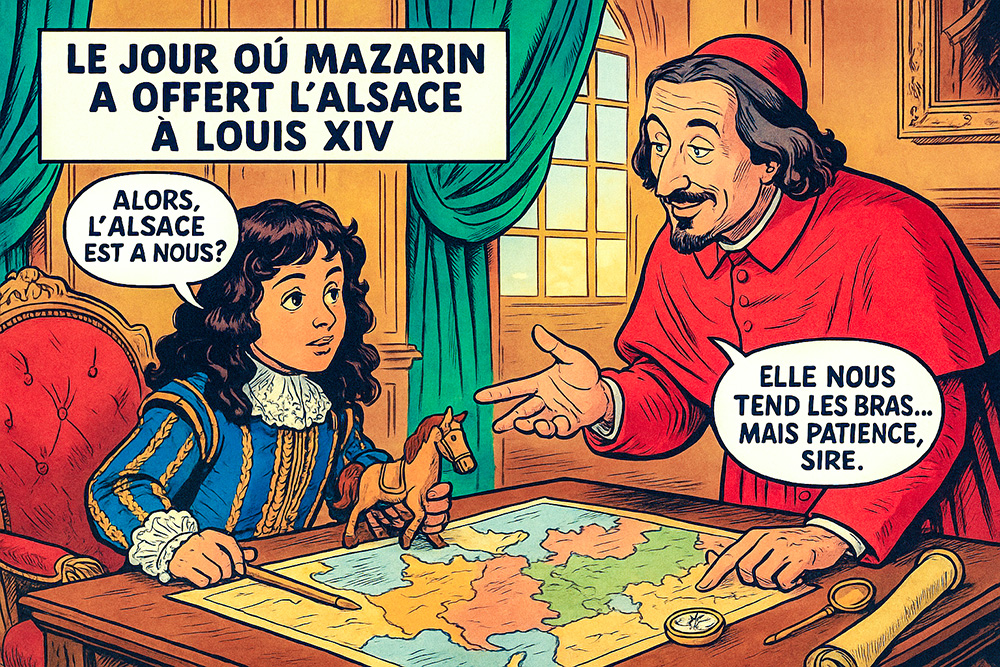
Louis XIV and Mazarin
Epilogue — Louis XIV and Mazarin: The King’s Gift
And, as so often in history, great diplomatic decisions end up… as notarial deeds.
A peace signed with a quill becomes, a few years later, private property.
Yes indeed. In December 1659, in Toulouse, Louis XIV — ever the grateful monarch — decides to reward Cardinal Mazarin for his service.
Not with compliments, oh no.
The king gives something tangible: “the county of Ferrette and the lordships of Belfort, Delle, Thann, Altkirch, and Isenheim…”
In short, the whole Sundgau — that little corner of Alsace quietly slipped into France’s pocket by the Peace of Westphalia.
(Ordonnances d’Alsace, vol. I, p. 17–20, for those who enjoy proper footnotes.)
Except — and here lies the elegance of the age — Mazarin receives the land, not the sovereignty. The king keeps the crown; the cardinal gets the rent. A gift, yes, but without the sceptre.
And because nothing under the Ancien Régime was ever simple, the word county begins to wander.
Here one speaks of the County of Ferrette, there of the County of Thann or Belfort. Everything blurs together — like the borders on a badly printed map.
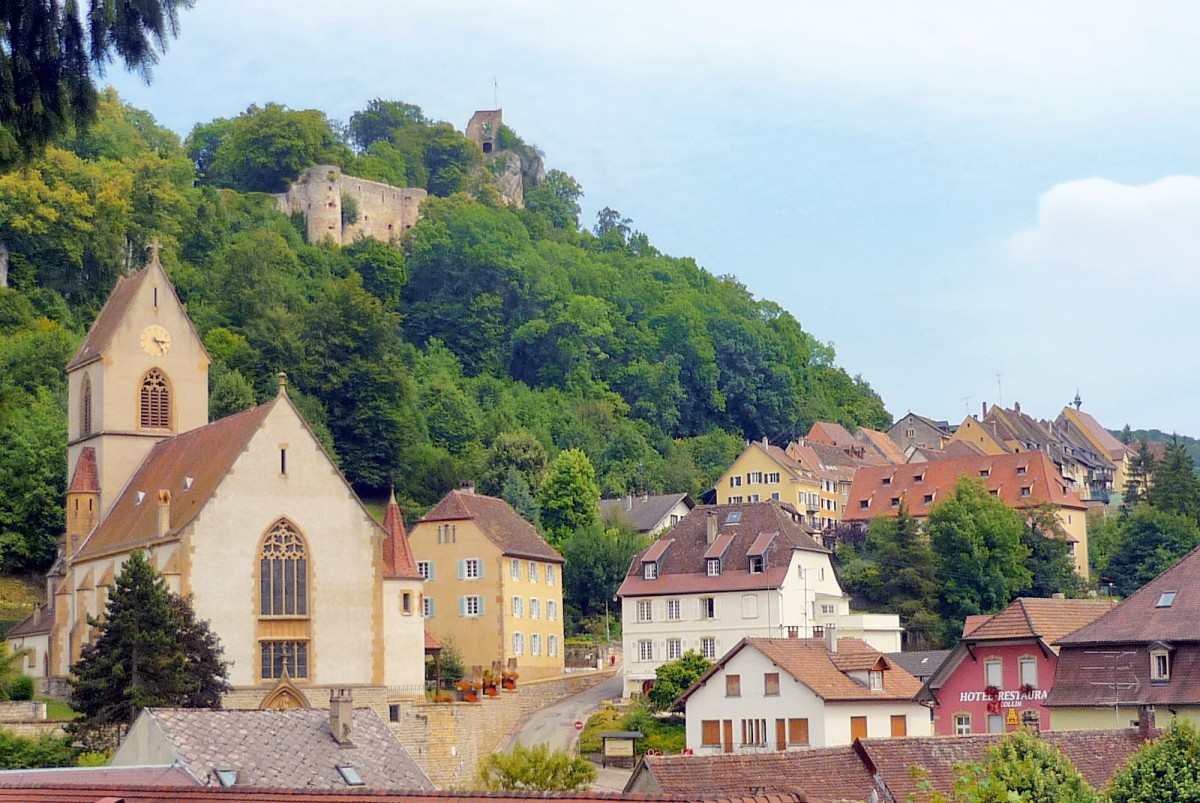
Louis XIV and Mazarin - Ferrette © French Moments
Mazarin’s heirs, for their part, couldn’t care less. They never set foot in Alsace.
What they see are the incomes, the harvests, the lawsuits — oh, so many lawsuits.
The result? Volumes upon volumes of archives, almost all in French — now preserved in Monaco. (Yes, Monaco. You’re following nicely.)
The final act of this little saga comes in 1791.
The Revolution sweeps away titles, privileges — and with them, Mazarin’s grand donation.
The Duchess of Valentinois, descendant of Marie Mancini — the cardinal’s favourite niece (the one he once dreamed of marrying to the king, but let’s not reopen that chapter) — tries, after the Restoration, to reclaim something.
No luck. Her former subjects, republican at heart long before the word was fashionable, have no wish to pay feudal rent again.
So the title, stripped of power, drifts gently south toward the Mediterranean.
By the alchemy of marriages, it lands in the hands of the Grimaldi — Princes of Monaco — who never ruled a square foot of the Sundgau, yet still keep the name.
And there you have it: a county born of a treaty, gifted to a cardinal, forgotten by his heirs — and ending up on the Rock.
French history, sometimes, can be summed up in a single sentence… and a few well-placed tax addresses.
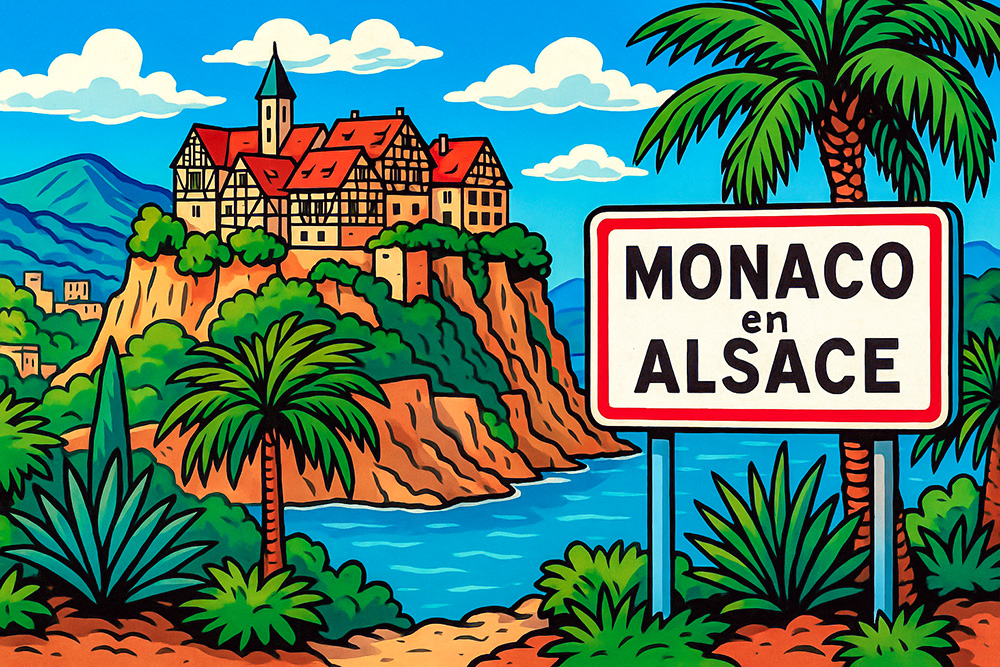
Louis XIV and Mazarin - Monaco in Alsace!
Want to Read More?
Loved reading this conversation between Louis XIV and Mazarin? Here are a few related blog articles you might enjoy:

